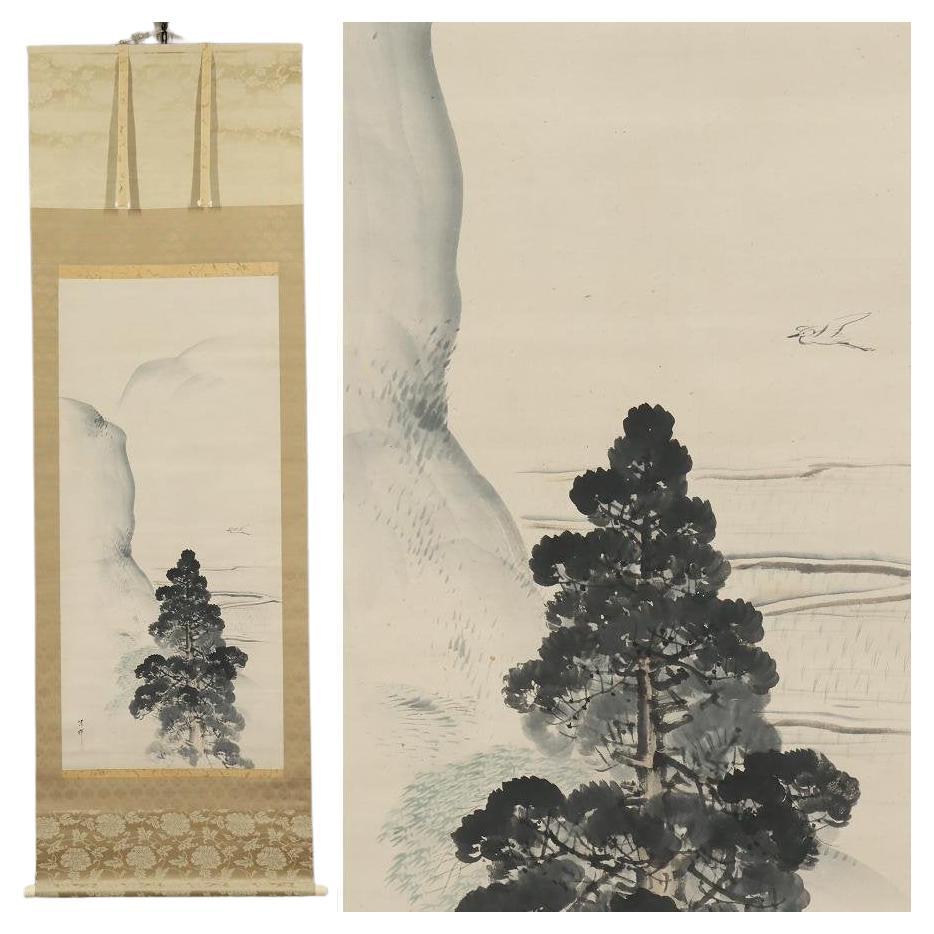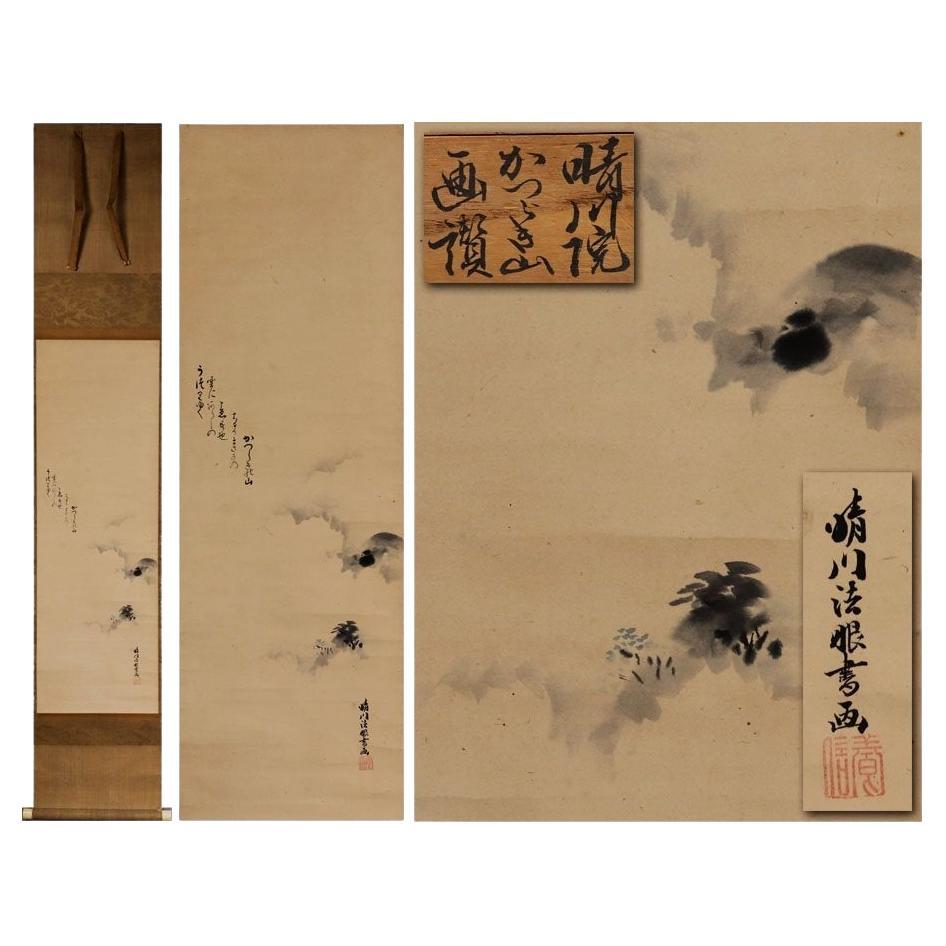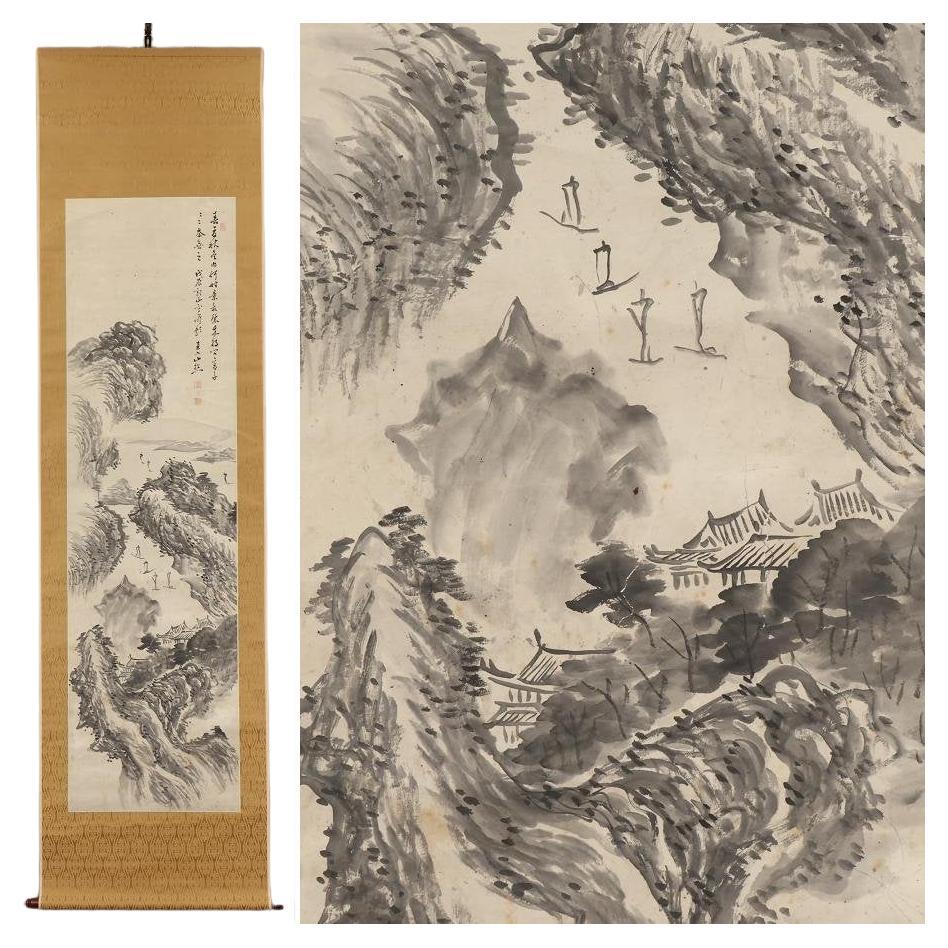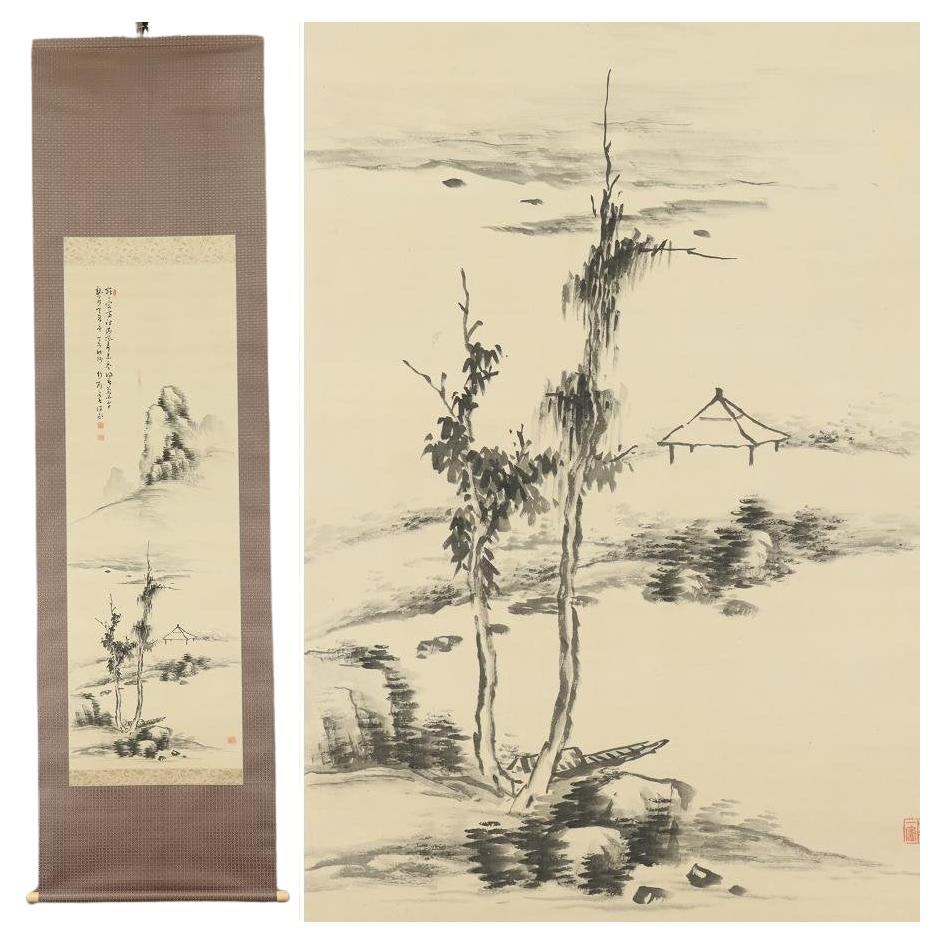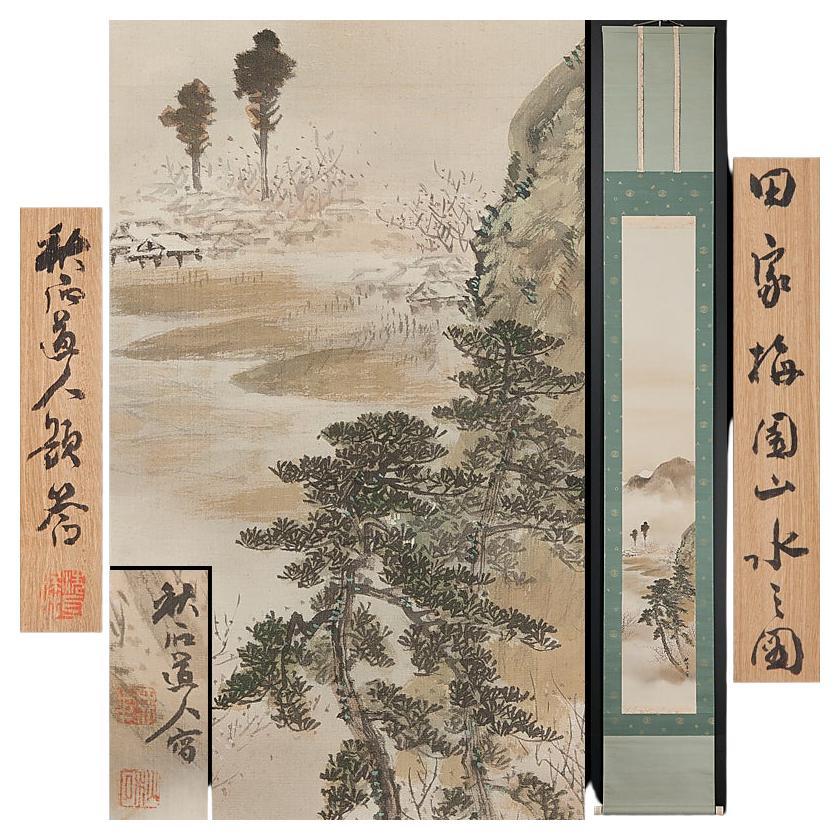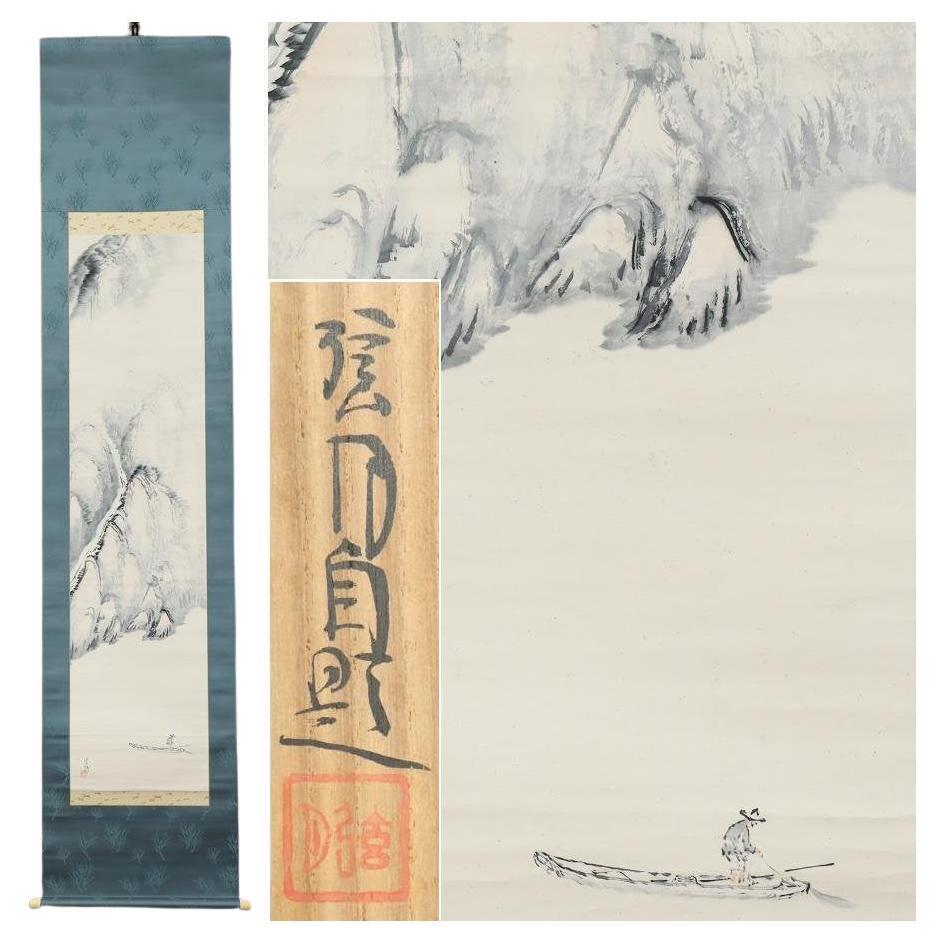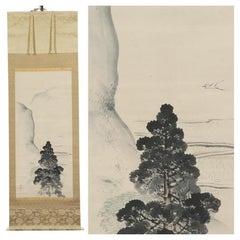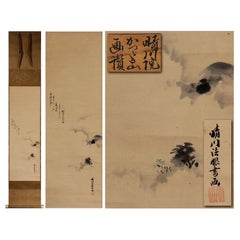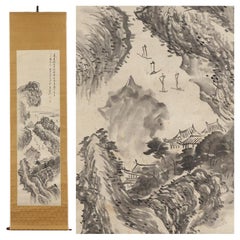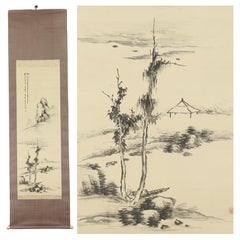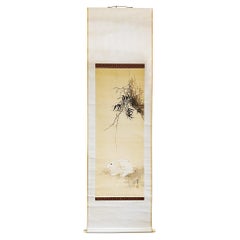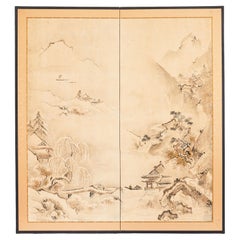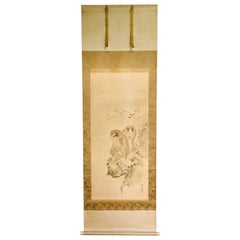Items Similar to Lovely Japanese Nihonga 19th c Edo Scroll by Okamoto Sukehiko , Winter Hermit
Want more images or videos?
Request additional images or videos from the seller
1 of 16
Lovely Japanese Nihonga 19th c Edo Scroll by Okamoto Sukehiko , Winter Hermit
$1,709.72
$2,137.1520% Off
£1,273.21
£1,591.5120% Off
€1,438.40
€1,79820% Off
CA$2,360.50
CA$2,950.6320% Off
A$2,616.96
A$3,271.2020% Off
CHF 1,375.32
CHF 1,719.1520% Off
MX$32,027.35
MX$40,034.1820% Off
NOK 17,176.31
NOK 21,470.3820% Off
SEK 16,121.68
SEK 20,152.1020% Off
DKK 10,951.50
DKK 13,689.3720% Off
About the Item
[Authentic work] ◆ Akihiko Okamoto ◆ Winter forest landscape ◆ Japanese painting ◆ Hand-painted ◆ Paper ◆ Hanging scroll ◆
Okamoto (Sukehiko Okamoto)
Sukehiko Okamoto
[Art yearbook appraised value 1.2 million yen]
Bunsei 6 (1823) - Meiji 16 1883
Japanese painter from the end of the Edo period to the beginning of the Meiji period.
His first name was Akihiko, his character was Zirou, his name was Gyosuien, his childhood name was Yasukichi, and his common name was Shiba. Born in Owari Province. Teachers: Toyohiko Okamoto and Goharu.
[Brief history and style]
Born in Handa Village, Chita District, Owari Province, as the fourth son of Hanshichi Oguri.
His father, Hanshichi, called Hakukei and was one of the Ten Tetsu under Kureharu, was born in 1792 and passed away on May 17, 1837 (June 19, 1837) at the age of 46.
Akihiko loved painting since childhood and became a student of Toyohiko Okamoto, a painter of the Shijo school. He had a particularly excellent talent for painting, so Toyohiko wanted to adopt him and let him inherit his family.
He specializes in a style that shows light brushstrokes that have a lyrical feel to them while still being sketchy.
He traveled around Hokuetsu, China, and in his later years lived in Mizue Village, Kuboya District, Bicchu Province, the hometown of Toyohiko, his teacher and adoptive father.
He passed away on November 18, 1883, in Kanazawa, Kaga Province. He passed away at the age of 61. He will be buried at Mt. Utatsu in Kanazawa. His posthumous posthumous name was ``Sumijinin Akio Akihiko Koji.''
This work is drawn by hand and on paper.
The box is a combined box.
This paper has small stains, wrinkles, curling wrinkles, and folds.
The front cover has small stains, wrinkles, moth bites on the edges, scuffs, and stains on the back.
Size:
Approximately [height 201cm x width 63cm/(main paper) 126cm x 51cm]
- Dimensions:Height: 79.14 in (201 cm)Width: 24.81 in (63 cm)Depth: 0.04 in (1 mm)
- Style:Edo (Of the Period)
- Materials and Techniques:
- Period:
- Date of Manufacture:ca 1850
- Condition:Wear consistent with age and use.
- Seller Location:Amsterdam, NL
- Reference Number:Seller: 501stDibs: LU4863237080642
About the Seller
5.0
Gold Seller
Premium sellers maintaining a 4.3+ rating and 24-hour response times
Established in 2015
1stDibs seller since 2019
268 sales on 1stDibs
Typical response time: 6 hours
- ShippingRetrieving quote...Shipping from: Amsterdam, Netherlands
- Return Policy
Authenticity Guarantee
In the unlikely event there’s an issue with an item’s authenticity, contact us within 1 year for a full refund. DetailsMoney-Back Guarantee
If your item is not as described, is damaged in transit, or does not arrive, contact us within 7 days for a full refund. Details24-Hour Cancellation
You have a 24-hour grace period in which to reconsider your purchase, with no questions asked.Vetted Professional Sellers
Our world-class sellers must adhere to strict standards for service and quality, maintaining the integrity of our listings.Price-Match Guarantee
If you find that a seller listed the same item for a lower price elsewhere, we’ll match it.Trusted Global Delivery
Our best-in-class carrier network provides specialized shipping options worldwide, including custom delivery.More From This Seller
View AllJapanese Nihonga Painting 19th c Edo Scroll by Seiki Yokoyama Landscape Shijo
Located in Amsterdam, Noord Holland
[Authentic work] ◆ Seiki Yokoyama ◆ Landscape ◆ Rural landscape ◆ Japanese painting ◆ Shijo school ◆ Hand-painted ◆ Paperback ◆ Hanging scroll ◆
Seiki Yokoyama
[Art yearbook appra...
Category
Antique 19th Century Edo Paintings
Materials
Silk
$1,234 Sale Price
20% Off
Lovely Japanese 18/19th c Edo Scroll Kano Osanobu Nihonga Painting Mountain
Located in Amsterdam, Noord Holland
Kano Osanobu (狩野養信)
Osanobu Kano (born August 18, 1796; died June 12, 1846) was the ninth painter of the Kobikicho Kano School in the Edo period. His common name was Shozaburo. His father was Naganobu KANO, and Tadanobu KANO was his son. His Go (pen name) was Osanobu Seisenin, Kaishinsai, and Gyokusen.
Brief Personal History
He was born the eldest son of Naganobu ISENIN during the Edo period. He was first sent to serve at Edo Castle at the age of 15, and it appears that he was apparently pushed by his father to perform various public tasks for the Kanon School. He kept a diary for 36 years, starting from the day before he first went into service at Edo Castle until the day before he died. The diary is entitles "Official Service Diary" (it consists of 52 volumes that are maintained at the Tokyo National Museum, and 4 volumes that are separately maintained at the different families), and have become the focus of a lot of attention in recent years for the detailed information they present on the daily life and work of a prestigious official painter. The reading of the characters of his name was originally "Takenobu"; however, with the birth of the first son of the Shongun Ieyoshi TOKUGAWA in 1813, whose name was Takechiyo, having a sylable with the same pronunciation of "Take"was deemed to be inappropriate, and was therefore changed to "Osanobu". Because Takenobu died the following year, after which he was referred to as Gyokujuin, Osanobu changed his pen name Gyokusen he had used until that point to Seisenin, in order to avoid using the same Chinese charcter pronounced alike. In 1819, he attained the second highest rank for a Buddhist priest, Hogen, and assumed the role of head of the family after his father passed away in 1828. In 1834 he attained the highest rank for a Buddhist priest, Hoin. He oversaw the rennovation of the wall paintings of Nishinomaru Palace of Edo Castle from 1838 to 1839, and Honmaru Palace of it from 1844 to 1846. It is thought that Osanobu later died due to the fatigue...
Category
Antique 18th Century Edo Paintings
Materials
Silk
$1,709 Sale Price
20% Off
Japanese Nihonga Painting 19th c Edo Scroll by Tonomura Chokunyu River landscape
Located in Amsterdam, Noord Holland
[Authentic work] ◆Tanomura Chokunyu ◆Ink painting landscape ◆Japanese painting ◆Handpainted ◆ Paper ◆ Hanging scroll ◆
Chokunyu Tanomura
1814 (Bunka 11) - 1907 (Meiji 40)
[Art yearbook appraised value 8 million yen]
"A child prodigy in painting, Tanomura Chokunyu originally modeled himself after the style of the famous Tanomura Chikuden (1777-1835), who had adopted him at the age of eight. After Chikuden's death, Chokunyu took up an intense study of imported Chinese paintings." Paul Berry in: Literati Modern, p.136.) - The certificate box was inscribed by Tajika Chikuson (1864-1922), one of Chokunyu's key disciples.
Around 1840, he studied Confucianism under Kotake Shinozaki in Osaka, deepened his friendships with Heihachiro Oshio and Tessai Tomioka through sencha, and began to be recognized as a painter.
Furthermore, in 1862, he founded and hosted the Seiwan Tea Ceremony (a sencha tea ceremony), which achieved great fame.
In 1868, he moved to Kyoto and participated in the establishment of the Kyoto Prefectural Painting School (opened in 1880), serving as its principal and making efforts to foster the next generation.Furthermore, in 1996, he established the Japan Nanga Association with Tessai and others, and established the Japan Nanga Association, which was established in modern Japan. He made a great contribution to painting and the southern painting...
Category
Antique 19th Century Edo Paintings
Materials
Silk
$1,709 Sale Price
20% Off
Japanese Nihonga Painting 19th Meiji Scroll Tajika Chikuson Landscape Nanga
Located in Amsterdam, Noord Holland
[Authentic Artwork] ◆ Chikuson Tajika ◆ Autumn Landscape ◆ Master: Naoiri Tanomura ◆ Oita Prefecture ◆ Hand-Painted ◆ Silk Mounted ◆ Hanging Scroll ◆
Delve into the artistry of Chik...
Category
Antique 19th Century Edo Paintings
Materials
Silk
$1,139 Sale Price
20% Off
Japanese Nihonga Painting 1900 Meiji/Taisho Scroll Shûseki, Okutani Landscape
Located in Amsterdam, Noord Holland
Susheki Okutani "Takaya Plum Garden Landscape"
Silk, Colored, Authentic, Hanging Scroll, , Double Box
size Axis: Height 206.5cm Width 29.3cm
Drawing…Height 126.7cm Width 19.5cm *There may be slight differences in dimensions. Thank you for your understanding.
situation It is in good condition, but please note that there are some light stains.
Please check the image for details.
Thank you for your support.
Biography Akishi Okutani
Japanese painter. Born in Osaka. His name is Tsunejiro. He studied under Kansai Mori. From an early age, he exhibited his works at the Japan Painting Association and the Young People's Painting Association, which was led by Gaho Hashimoto and Gyokusho Kawabata, and won numerous awards. He also opened a private school...
Category
20th Century Taisho Paintings
Materials
Silk
$1,709 Sale Price
20% Off
Japanese Painting Taisho / Showa Period Scroll by Yazawa Gengetsu Landscape
Located in Amsterdam, Noord Holland
[Authentic work] ◆ Gengetsu Yazawa ◆ Mountain and Lake Off Day ◆ box ◆ Landscape ◆ Nagano Prefecture ◆ Handwritten ◆ Paperback ◆ Hanging scroll ◆
Gengetsu Yazawa
Art yearbook appr...
Category
Vintage 1930s Taisho Paintings
Materials
Silk
$1,795 Sale Price
20% Off
You May Also Like
Japanese Hanging Scroll, Late 19th Century
Located in New York, NY
A Japanese hanging scroll or Kakejiku, circa 1890, depicting bamboo grass and a rabbit, framed by top and bottom ribbons of brocade silk.
In ...
Category
Antique 1890s Japanese Meiji Paintings
Materials
Silk, Paper
$2,624 Sale Price
20% Off
Japanese Painting of Mountain and village, Hanging Scroll
Located in Greenwich, CT
Japanese scroll painting depicted village in the mountain
Ink and paper. Artist signed
Overall size: 43" height. 21" width
Image size: 10.8" height. 16" width
I am planning to re...
Category
Vintage 1940s Japanese Paintings and Screens
Materials
Paper
$600 Sale Price
29% Off
Japanese Meiji Two-Panel Screen Chinese Country Winter Landscape
Located in Rio Vista, CA
Late 19th / early 20th century Japanese Meiji period two-panel folding byobu screen featuring a winter landscape with a Chinese country villa and distant village. Kano School screen ...
Category
Antique 19th Century Japanese Meiji Paintings and Screens
Materials
Brass
Japanese Silk Scroll Painting of Moneys Edo Period Mori Tetsuzan
Located in Atlanta, GA
A Japanese mounted vertical hanging scroll painting by Mori Tetsuzan (Japanese, 1775-1841) circa 19th century Edo period. The watercolor and ink on silk ...
Category
Antique 19th Century Japanese Japonisme Paintings and Screens
Materials
Silk, Paper
Japanese Two-Panel Screen: Ink Landscape on Silk
By Shunyu
Located in Hudson, NY
Japanese Two Panel Screen: Ink Landscape on Silk, Meiji period (1868 - 1912) painting of a man riding a mule on a pathway through the Kurotani mountains with a thatched roof shelter ...
Category
Antique 19th Century Japanese Meiji Paintings and Screens
Materials
Silk, Wood
Japanese Silk Scroll by Haruki Nanmei Edo Period
Located in Atlanta, GA
A Japanese hanging silk scroll by late Edo period painter Haruki Nanmei (1795-1878). The gouache painting was in the tradition of Kano school and depicts an old scholar dressed in lo...
Category
Antique 19th Century Japanese Edo Paintings and Screens
Materials
Silk, Paper
More Ways To Browse
Japanese Wall Hanging
Japanese Scroll Landscape Painting
Japanese Hanging Scroll
Japanese Painted Silk Scroll
Japanese Silk Wall Hanging
Japanese 19th Century Meiji Period Silk Painting
Silk Chinese Wall Hanging
Voc Plate
Walnut Hutch
White Wicker Bedroom
18th Century 3 Drawer Chest
9 Drawer Chest Of Drawers
African Throne
Amsterdam Clock
Antique Canoe
Antique Church Bell
Antique Korean Chests
Antique Metal Swing
